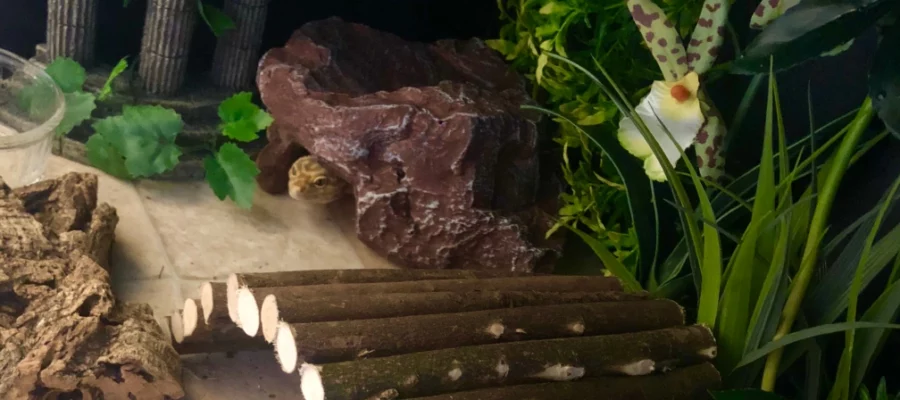Something that is quite confusing if you have never owned reptiles before is how to provide them with adequate heat.
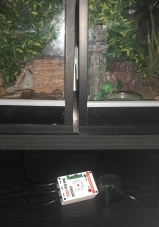 It is important that the geckos’ enclosure provides ample heating, as they cannot generate their own heat, unlike mammals.
It is important that the geckos’ enclosure provides ample heating, as they cannot generate their own heat, unlike mammals.
In the wild, geckos get their warmth from lying on sun-heated rocks and in warm enclosed spaces; never in direct sunlight, and so a heat lamp is not needed. In fact, it is possible to distress your gecko with too much heat, so unless you really cannot achieve the correct temperature with a heat mat alone, you should avoid buying a heat lamp for your gecko.
The important things you’ll need to buy:
- Heat mat (essential)
- Thermostat (essential)
- Thermometer/ hygrometer (recommended)
- Substrate (essential)
Heat Mat
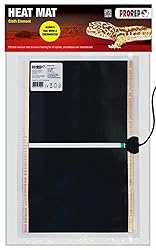
ProRep Cloth Element Heat Mat 17×11″ 20w
The heat mat should cover about one third of the total ground space, giving the enclosure a warm side and a cooler side.
This gives the gecko the ability to regulate their own temperature and choose which area they would like to stay in.
Make sure you measure your own vivarium and get the most suitable sized heat mat.
I use: Pro Rep Heat Mat
Thermostat
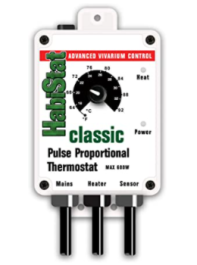
Habistat Thermostat 600W White
To make sure the temperature of your heat mat doesn’t get too much for your gecko, it should be connected to a thermostat, which will regulate the temperature of the mat you connect it to. Set the temperature to around 28C (or 85F) to begin with – you can adjust this based on your geckos’ preferences. If they never lie there, it’s probably too hot and if they are inactive, don’t eat much, or never leave that spot, it’s probably too cool. The sensor should be placed on top of the substrate, near the area where your geckos stomach would be resting (see diagram below).
I use: HabiStat Mat Stat Reptile Thermostat
Thermometer/ Hygrometer
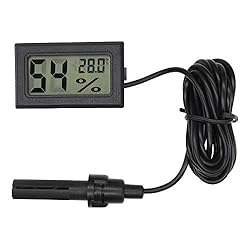
diymore LCD Digital Mini Embedded Thermometer Hygrometer Temperature Humidity Gauge Meter Probe for Reptile Incubator Aquarium Poultry (Black with Cable)
Many leopard gecko owners also choose to have a thermometer to monitor the internal temperature of the enclosure, and a hygrometer to monitor humidity levels (it should be 20%-40%). If the tank isn’t humid enough, a spritz of water or adjustment to the airflow usually rectifies this.
I use: A basic thermometer/ hygrometer from Amazon
Substrate
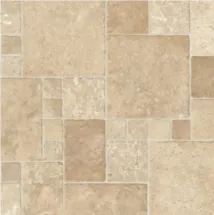 The substrate is placed on top of the heat mat, but underneath the sensors.
The substrate is placed on top of the heat mat, but underneath the sensors.
Please see my posts on substrate:
Which is the best substrate for leopard geckos?
Does sand/ loose substrate cause impaction in leopard geckos?
Vinyl substrate for leopard geckos: Review
I use: lino/ linoleum/ vinyl
We are now selling vinyl substrate: click here to purchase some
Basic Diagram & instructions for leopard gecko heating setup
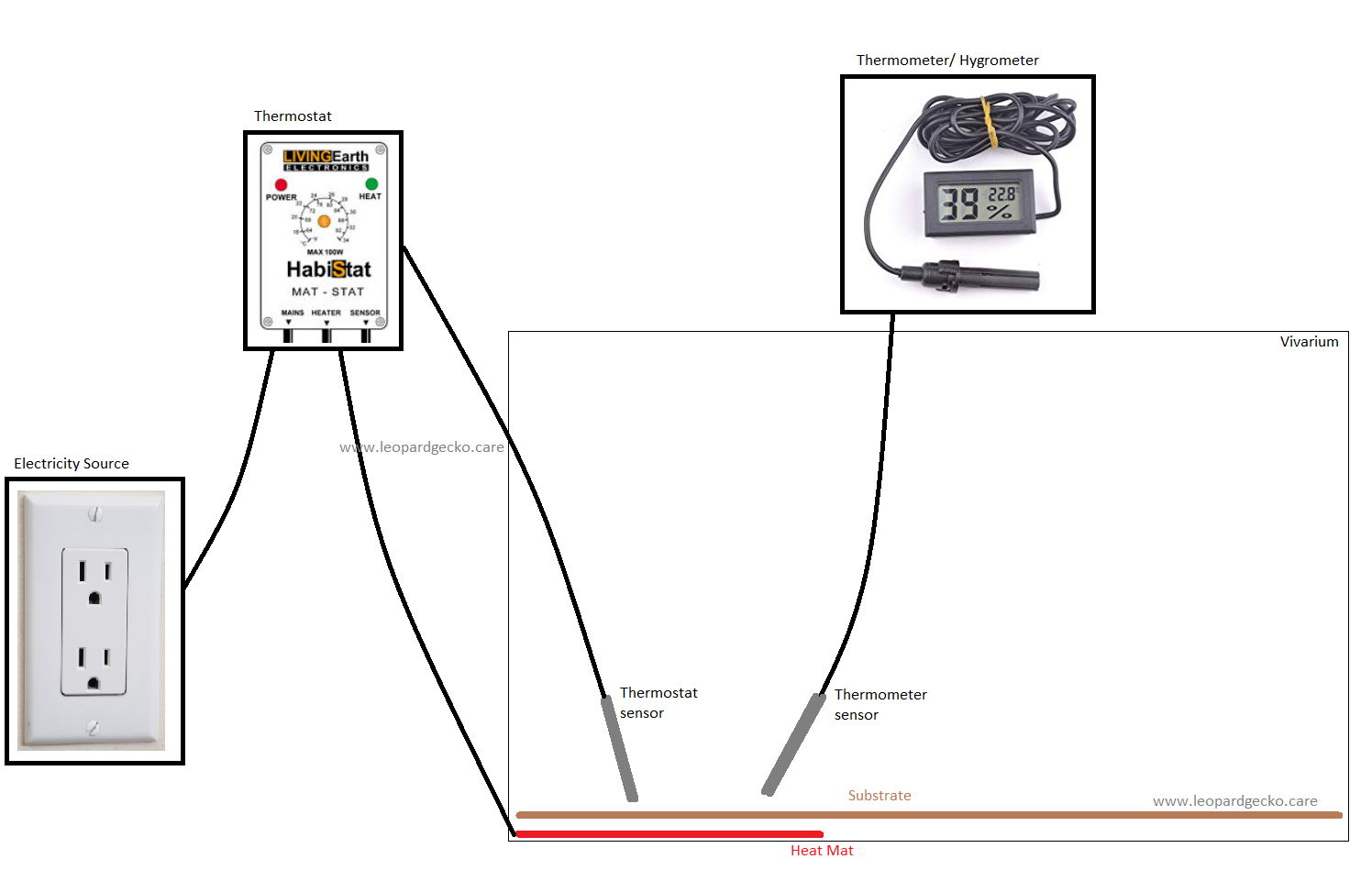
- Place the heat mat on the bottom of your vivarium on either the left or right side. This will be the warm side.
- Connect the heat mat power cable to the “heater” socket on the thermostat
- Plug your thermostat into the mains electricity source
- Place your substrate on top of the heat mat
- Place the thermostat sensor on top of the substrate, close to where your leopard gecko will lie on the hot side of their vivarium
- Place your digital thermostat sensor on top of the substrate, near the thermostat sensor
- Finally, arrange your hides, food/water dishes and decorations (at the very least, have one hide on the hot side, and a moist, cooler hide on the cold side).
This is how my setup looks without the warm hides on top.
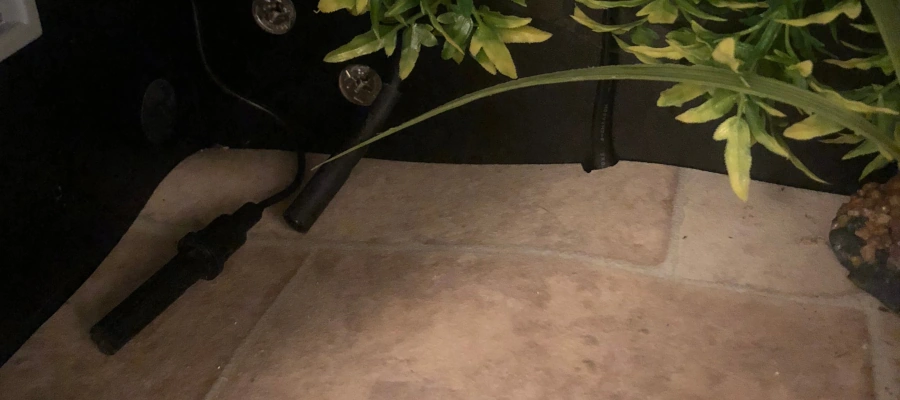
We are now selling vinyl substrate: click here to purchase some
Get Your Free Leopard Gecko Care Checklist!
Are you ready to give your leopard gecko the best care possible? Download our FREE PDF e-book featuring a comprehensive care checklist!
This handy guide covers everything from habitat setup to feeding and health tips, ensuring your gecko thrives.
👉 Download your checklist now!


